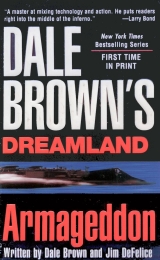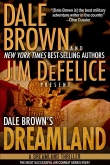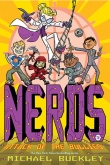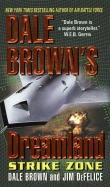
Текст книги "Armageddon"
Автор книги: Dale Brown
Жанр:
Боевики
сообщить о нарушении
Текущая страница: 16 (всего у книги 20 страниц)
While the PRC-90 was still used by some aircrews, it had been superseded by newer models long ago and had a number of drawbacks as a general-purpose radio, not the least of which in this case was its limited range. It had an auto-beacon mode which sent out special distress signals, as well as a voice mode, but it could only communicate effectively with another radio in line-of-sight, and given the terrain there was no hope of being able to contact the Dreamland Command trailer directly. But Dog hoped that its signal might be picked up by one of the LADS units or perhaps an aircraft operating nearby. In any event, it was all they had.
Something caught his eye in the brush about thirty yards away. He pushed the radio transmit switch to “auto beacon,” then tossed it down and pulled out his Beretta. When the shadow moved again he fired twice; the pistol jumped in his hand and his second bullet hit the leaves high above.
Lang yelled something to him, then started firing. As he did, the Humvee was peppered with gunfire. Dog flattened himself, then pulled his pistol into firing position, both hands properly on the weapon this time. He sighted into the brush, waited until he saw something move, then fired. The recoil didn’t seem nearly as bad this time.
“They’re all over the place. Get back here!” Lang yelled.
“Good idea,” shouted Dog. He slipped the radio into the pack and backed up, still moving on his stomach. As bullets began ripping into the ravine, Dog scooped up his knapsack and ran for it, crossing in two bounds and diving head-first into the bushes. Guns popped everywhere. Dog waited for the burn and catch in his stomach and chest, sure he’d been hit. When they didn’t come he turned himself over and crawled on his hands and knees to Lang, pushing the rifle to him and then retrieving the PRC-90.
He made a broadcast. He didn’t get a response but he hadn’t really expected one; he tried twice more, then put the unit back on beacon. The radio was small enough to slide into the pocket on his bullet proof vest.
“I couldn’t find your radio,” Dog told the other man. “This unit has pretty limited range. It may be a while before someone hears mine.”
“I don’t think it matters at the moment,” said the soldier. “We’re on our own here.”
“They’ll send somebody for us.”
“They don’t have anybody to send,” said the soldier. “At least not right away.”
Dog reached back into his pack for his first-aid kit. “Your face is cut up,” he told the soldier. “I have some antibacterial ointment that’ll keep it from getting infected.”
“Save it for yourself.”
“I’m not cut,” he said.
The soldier looked at him as if he were out of his mind.
“I’m cut?” said Dog. Then he remembered that he had gashed his hand and arm. He looked down at it, and saw that much of his uniform was torn and covered with blood. “This is nothing,” he told Lang.
Despite their predicament, the soldier laughed. “That’s the spirit, Colonel. Keep thinking positive.”
Southeastern Brunei
Exact location and time unknown
This time, Mack was ready when the door opened. He’d filled the can with urine and was poised near the door, balanced on his haunches and ready to spring.
He hit the big man full in the face with the urine; as the terrorist reeled backward, Mack bolted through the open space, aiming to flatten the man in the hallway who stood guard with the rifle. He caught him in the neck with his fist, then felt himself tumbling across his body, the AK47 in his hands.
How he got it turned around, much less how he managed to aim it or make sure it was ready to fire, Mack didn’t know. It seemed to him that one second he was smacking his left shoulder against the wall and the next he was standing over the two dead Muslims, the AK47 smoking. The hallway became a cave filled with smoke. Mack saw the door at the end of the hall in front of him and ran for it, sure that flames were roaring behind him.
Someone shouted as he flew through the door. He turned left and right, firing from his hip and not stopping, never stopping as he ran for the road. As he reached it he heard the pop-pop-pop of an assault rifle behind him; the next second he fell nearly straight down. He threw his hands out, realizing he’d slipped onto an embankment, but there was nothing to grip, and he tumbled wildly down a deep ravine, sliding past a thin strip of vegetation to dirt and stone and then mud. He crashed into a wide, deep stream, flailing in the water that bit at him and pushed him wildly backward in its current. At first Mack was content just to get away. Then he realized the rushing water represented a danger all its own. He tried to grab something, anything, and stop himself from being carried away. Finally, at least a mile if not more from where he had gone in, Mack crashed into a log and managed to hold on.
Water rushed all around. He spit and coughed as he worked himself up the log toward the stream’s bank. He kicked against something solid; thinking he could stand he tried to get his feet under him, only to lose his balance and nearly his grip on the log.
When Mack finally got to the side, he crawled up over a small, narrow bed of sand into the bushes. There, exhausted, he lost consciousness.
Dreamland command trailer, Malaysian air base
1220
Zen had just finished showing Starship how to work the communications board in the command trailer when Danny checked in from the platform.
“We have movement at the airport near the Megafortress,” said Danny. “I’m going to knock it out of action with the helicopters as planned. We’re just about to board the choppers.”
“Okay, do it.”
Danny hesitated a moment. “I have this other proposal—request, really. From the Brunei air force. They want to liberate one of their planes.”
“At the airport?”
“There’s apparently a section owned by a prince that has older aircraft, which could be used.”
“We’re talking about Prince bin Awg?”
“Yeah. We’ve examined the airport with the LADS blimps. There are no forces in that section, and we can cut off their access pretty easily once we disable the Megafortress”
“I’d say go for it. Just don’t take any unnecessary risks.”
“Yeah. Dog’s not around?”
“Went to pay a courtesy call on the locals. He’s due back any minute. I’ll have him get a hold of you when he’s back if you want.”
“All right. I’m going to move ahead”
“I’ll have him get in touch, one way or another,” said Zen.
A peal of thunder rumbled in the distance as Zen signed off. Zen looked over at Starship, who glanced toward the nearby window. There wasn’t a cloud in the sky.
A second clap came so close that the trailer vibrated up and down.
“Was that thunder?” asked Starship.
The door to the trailer jerked open. “Incoming!” yelled Major Merce Alou. “We’re being shelled!”
“Shit. The planes,” said Zen, wheeling back. “We have to get the Megafortresses up. They’re sitting ducks.”
“Right,” shouted Alou, disappearing back outside.
“We’ll never get off the ground,” said Breanna.
“We have to,” said Zen, pushing his wheelchair for the door.
Off the coast of Brunei
1228
Jennifer took over the LADS system for Sergeant Liu as he left to join the assault team. Jennifer made sure the feed for the airport was directly available to Danny’s team via the Dreamland network, then began switching through the others. The images were also being monitored back at Dreamland. The command center there was also receiving some of the operating data from the blimps, but could not control them unless the takeover command was specifically ordered from the field terminal. The satellite link used up a large portion of the available bandwidth, and was somewhat kludgy; it was generally considered easier to operate them directly from the field.
It had been a while since Jennifer had spoken to Dog, and she couldn’t resist the temptation to check in with him at the Malaysian base under the guise of seeing if the two additional LADS blimps had arrived there yet.
“Dreamland command trailer, this is Whiplash base,” she said. “Looking for an update on the new units. What’s their situation?”
There was no answer. Jennifer glanced at the communications board, making sure that she had it set properly.
“Dreamland command trailer—are you receiving me?” she asked.
“We’re under attack,” blurted Starship over the radio. “We’re taking mortar fire.”
“Mortar fire, copy,” she said. “Do you need assistance?”
There was no answer. Jennifer looked at the screen showing where the LADS units were located; the nearest blimp was monitoring the Brunei-Malaysian border about a hundred and seventy-five miles away from them—much too far to see them.
“Do you need assistance?” she asked again, but there was still no answer.
“Dreamland command, this is Whiplash base,” said Jennifer, switching over to the direct channel back home. “The team with the Megafortresses in Malaysia is under fire.”
“Copy. We’re working on getting some local support,” responded Major Catsman, who was on duty in the center.
“Okay,” said Jennifer, her voice so soft it was nearly a whisper.
What could she do? Sending one of the LADS units there seemed like a futile gesture; even at maximum speed it would take the blimp close to four hours to arrive.
But she had to do something. She selected the control screen for unit eight and cursored into the target area, setting the course. Then she enabled the unit’s auto-pilot; the blimp would fly its course on its own without needing to be checked, and then politely buzz its minders when it was within ten minutes of its destination.
“Whiplash Leader, are you hearing me?” she asked Danny.
“Roger base. We have the Megafortress in sight on the ground at Brunei International Airport. We’re preparing to disable it via TOW missiles.”
“Dreamland team is under fire at their site,” she told him.
Danny didn’t respond. Jennifer suddenly felt foolish for giving him the useless information; all she was doing was sharing her anxiety.
“I’m sending a blimp for observation,” she added. “They’ve called local support”
“Understood,” said Danny finally. “Keep me informed.”
“Roger that.”
Malaysian air base
1232
Zen cursed the wheelchair, cursed the Brunei kingdom, cursed the Malaysians, cursed the Islamic madmen, and cursed his no-good legs as he pushed himself along the cement as fast as he could go toward the EB-52, determined to help get it in the air. The short field—and certainly the situation—demanded that the Flighthawks be used as boosters, helping the plane rocket off the runway.
The ground shook as a shell landed about a hundred yards away.
Shit, he thought to himself. This is crazy. But he pushed harder, determined to get the big planes off the ground.
And then launch the Flighthawks to pound the daylights out of whoever was firing at them.
Zen felt the veins in his face and chest straining as he wheeled onto the roadway. A geyser burst somewhere behind him, close enough to throw dust against the back of his head.
Something grabbed the back of his wheelchair and he felt himself jetting forward.
“Hey, Major, figured you wouldn’t mind a push,” yelled Starship in his ear.
“I’m in Penn,” shouted Zen. “See if you can get into Indy. They need the assist off the Flighthawks.”
“Yes, sir.”
If Starship thought it was crazy to try and take off under such circumstances, he kept his opinion to himself. Zen twisted around. “Where’s Kick?”
“I think he’s already aboard with Major Alou, there,” shouted Starship.
Another shell landed, this one in the jungle to the left. The Air Force Special Tactics people started yelling as they hustled to the aircraft. Zen couldn’t hear what they were saying though it wasn’t particularly hard to guess.
“You can let go,” Zen told Starship as Penn’s engines kicked to life. “I’ll take it from here”
“Talk to you upstairs,” said the lieutenant, giving him a push and then hustling for Indy, whose engines also wound into action.
Zen had to twist the wheelchair around and back into the ladder, which had a special clamp for his chair. He hooked the metal into the side, then looked down to make sure the wheels were locked. Set, he arched his back and shoved hard, as if trying to pop a wheelie. The abrupt pressure activated a micro-switch, which turned the ladder into a primitive elevator, hoisting Zen up. As he lifted up, yet another shell landed, this one on the runway; the wheelchair abruptly stopped, sagging against the metal pipe that held it.
“Come on, damn it,” cursed Zen. He leaned backward, trying to see how far he was from the hold. Just as he had concluded he was going to have to twist around and drag himself up the stinking ladder and into the ship, the chairlift caught again and he moved up into the hold.
Hell of a time to be a cripple, he thought.
BREANNA BROUGHT ALL FOUR ENGINES UP IN QUICK succession. The screens flew by on the glass cockpit wall, the indicators flashing green as the computer ran through its system checks. She’d grabbed a helmet from the rack at the back of the flightdeck, and pulled it on, connecting into the communications system. But she hadn’t had time for the rest of the flight gear.
“Override checklist,” she told the computer.
The screen beeped at her, telling her the override was not allowed.
“Override, authorization BreeOne”
“OVERRIDDEN!” flashed on the screen.
“Who’s with me?” she said over the com system.
“You and me, kid,” said Zen from below. “I need power to the Flighthawks if you want to get out of here.”
“Take too long,” she said. “I’ll jettison them and run down to the other end of the field.”
“All I need is sixty seconds,” said Zen. “And you’ll have enough thrust to take off from here.”
A shell landed close enough to rock the plane. “Do it in thirty,” she said, pounding the command sequence on the screen that authorized the Flighthawks’ engine ignition while they were still on the wings.
“I’m on it.”
STARSHIP FOUND KICK ALREADY RUNNING THROUGH THE Flighthawk checklists with the computer when he reached his station.
“Hey!” he yelled, sliding into his seat.
“Hey,” said Kick. “Major Alou wants a quick start—he’s got the engines up. Flighthawks are cycling.”
“Yeah, no shit,” said Starship.
“We have to give him a thirty-second burn on his signal,” said Kick. “Zen says just ramp it up and hold on. As long as we go together, we’ll get up in a shot.”
“Zen would know,” said Starship.
The airplane bucked as something landed nearby.
Hope we get the hell out here quick, Starship thought.
“Yeah, me, too,” said Kick over the interphone.
North of Meruta, Malaysia
1232
DOG COULD SEE THE THREE MEN WHO HAD THEM PINNED down. They formed a semicircle in the jungle; they’d crossed the road and moved in about ten yards.
“We pick the weak link on one of the flanks, and take him out,” said Lang. He’d torn a piece of his uniform off and tied it around his leg, which had been cut pretty badly.
“What if they have other people on the flank, watching their backs?” asked Dog.
“We deal with that when it happens.” Lang winced as he shifted his weight. “Can you do this?”
“Yeah, I can do it.”
The sergeant handed him one of the M4s.
“You better show me how to get it to fire,” said Dog. “I couldn’t before.”
Lang took the gun back and slid his thumb against the selector on the side above the trigger area. The weapon had been safed. As he watched him Dog realized he hadn’t even thought of checking.
“Brace yourself as best you can when you fire. You get three shot bursts,” said Lang, handing the weapon back. “You’ll probably tend to fire too high. Keep that in mind”
“I will.”
“We’re going to go after the guy on this side,” said the sergeant, gesturing to the left, “because if we get past him, we’re clear back to the village.”
“Okay,” said Dog. “Hold on a second, Sergeant,” he added as the soldier started to the left.
Lang gave him an intense stare.
“I’m sorry, but I forgot your first name”
“Tommy,” said the sergeant, scowling.
“Sorry I forgot. I’m Dog.”
“Yeah, I know, Colonel. Let’s do it, okay?”
Brunei International Airport
1232
Danny leaned forward in his seat in the helicopter as they settled into a hover a little less than a thousand yards from the Megafortress. The terrorists who had driven the tanker in from the city got out of the cab.
“They’re going to shoot at us,” he said calmly as the pilot stabilized the aircraft.
“Firing,” said the pilot.
A TOW missile leapt from the side of the small chopper. The six-inch warhead hit the right stabilizer at the rear of the aircraft, carrying through the structure and exploding next to the left fin. A second missile, fired at the rear section of the plane, struck a few seconds later, obliterating the back portion of the aircraft.
“All right,” yelled Danny. “Phase two, phase two.”
The helicopter whipped to the side, spinning back around over the civilian terminal. The other helicopter had already started in toward bin Awg’s three hangars. The video feed from the LADS that showed there were no terrorists nearby but Danny wouldn’t trust it; the helicopters did a quick circuit to make sure the ground was clear before depositing the Whiplash team on the ground.
“McKenna, you got twenty minutes,” Danny said over the com circuit. “If you can get that plane launched by then, it’s yours”
“I only need fifteen,” she shot back.
Malaysian air base
1238
Breanna brought the EB-52’s engines to full military power, the thrust rippling through the muscles of the big jet as it was held in place by its brakes.
“Ready?” she asked Zen.
“Ignition in three,” he said.
They counted down together. At two, Breanna slapped off the brakes and the big jet leapt forward, propelled by nearly a quarter of a million pounds of thrust from its four P&W engines. A second later the Flighthawks added their thrust. Within a blink the plane’s speed passed a hundred miles an hour. Bree started back on the stick and the aircraft rushed upward, springing off the pavement as if its landing gear were pogo sticks.
A black streak flew across the right side of her windscreen; by the time Breanna realized it was a mortar shell she was far beyond it. The impact of the explosion was lost in the turbulence behind the aircraft; if it affected the plane at all the computer controls compensated without Breanna noticing. She held the Megafortress steady as the plane rose over the runway and out of danger.
* * *
STARSHIP GLANCED AT KICK AS THEY COUNTED DOWN together with Major Alou and the computer. The EB-52 vibrated madly, and the noise of the revving engines leaked past the noise-canceling headgear, a steady hum in the back of his head.
‘Two,” they said, and the Megafortress began to roll, cued by Major Alou up on the flightdeck.
“Three,” they said, and the Flighthawk engines whipped on. Starship felt himself pushed back in his seat as the Mega-fortress burst ahead in quick-takeoff mode. His view screen played a feed from the nose of the Flighthawk; he could see the tail of the other Megafortress disappearing to the right. The strip and surrounding jungle slid by, the EB-52’s speed ramping quickly. He could feel the plane starting to lift, gravity beginning to tilt his body back like the gentle rock of a cradle.
And then the plane sagged left. Something popped in Starship’s ear. A red emergency light blinked, and as Starship reached his hand to the screen control, a cold curtain of darkness descended around him and he fell unconscious.
ZEN SHUT DOWN THE FLIGHTHAWK ENGINES AND BEGAN cycling fuel into Hawk One, replacing what they had used to get off the runway.
“Indy was hit,” Breanna told him. “They didn’t get off the runway.”
Zen felt his throat tighten. Trying to take off had been foolhardy, a ridiculous gamble. He was responsible for the men who’d been in that plane.
He glanced at the instrument screen on his left—he was using the auxiliary controls, since there hadn’t been time even to get his helmet—double-checking that he had enough fuel to launch.
“Ready to launch Hawk One in sixty seconds,” he told Breanna.
WHEN STARSHIP OPENED HIS EYES, HE WAS AT THE STICK of an F-15E. The altimeter ladder in his heads-up display showed that he had just notched up over forty thousand feet, and he was still climbing, winging upward like an angel called to heaven. The blue void of the atmosphere thinned as he rose, the color paling into white and then becoming almost black. The black deepened, and still he climbed, over a hundred thousand feet now, the altimeter calmly notching it off. One-ten, one-twenty, one-fifty, two hundred…
“I can’t go this high,” said Starship. “Not in a Strike Eagle.”
With that thought, the blackness turned red and he felt his body twisting hard against his restraints. His arm smacked against something hard and he heard a scream coming from the middle of his chest.
“I got to get the hell out of here,” said Starship, and by instinct he reached for the ejection handle, but he couldn’t find it. He managed to get his head down and look, then realized he couldn’t eject—they were too low, too low—
No, they were on the ground, and the seats hadn’t been properly prepared besides.
He saw one of the emergency lights blinking on a panel and realized they had crash-landed at the end of the runway.
“Out, out, out!” he yelled, and started to jump from his station. He couldn’t move and for a moment he despaired, thought he’d been crippled like Zen.
He’d kill himself before he lived like that, as much as he admired the older pilot.
And then he realized he was still buckled into his seat. A wave of relief powered into his legs and arms as he threw off the restraints, bolted upright, and started for the exit. He remembered Kick, turned and saw that he was still back in his seat. Starship shook him, then when he didn’t respond reached down and unsnapped the buckles, helped him up—more like picked him up—and dragged him behind him to the hatchway. The motor that worked the ladder growled as the lower door started to open. Something in the mechanism snapped and it stopped after moving only an inch or so. Starship pounded on the control, but it didn’t move. He swung around and tried kicking at the hatchway, first gently and then with all his weight, but nothing budged.
“Upstairs,” he told Kick, who was crouched over where he’d left him.
Starship grabbed his friend and tried pushing him up the ladder which led to the flight deck, but Kick was so out of it that he finally draped him over his side and back and pulled him up with him, crawling onto the rear of the long cockpit area. “Major Alou! Merce! Merce!” he yelled to Alou.
The pilot sat at his station, head slumped over, hand on the throttle slide. As Starship came close, he saw that the front wind panel and some of the aircraft structure around it had been shattered. A piece of metal twice the size of Starship’s hand had embedded itself in the side of Alou’s head. Blood covered everything around the pilot.
“We got to get the hell out of here,” he told Kick. He started to go back down, thinking they could use the emergency hatchways at the forward part of the Flighthawk compartment. But then he realized it would be quicker to use the emergency roof hatches above the ejection seats, which could be blown out by the computer or by hand.
He squeezed past the center console, trying not to look at Alou. The consoles were still lit.
Starship got up on the seat, balancing awkwardly as he struggled with the hatchway. He fumbled with the large red bar that had to be pushed back to override the computer’s emergency system and access the controls directly. Once that was out of the way, he hit the thick, square button at the top of the panel, which blew all of the upper hatchways off at once.
“Up we go, up we go!” he yelled to Kick.
He put his head out of the hatchway, breathing a whiff of the hot, humid jungle air. A machine-gun started to fire in the distance.
Starship ducked back down. Maybe it would be better to stay in the plane, where at least there was a modicum of cover. But the Megafortress would be a target for whomever was attacking; he turned and yelled at Kick, who still hadn’t moved off the deck.
“Yo, Kick boy, time to get the hell out of here,” he yelled to his companion. Once again he draped the other pilot across his back, wobbling as he snaked around and then up through the hatchway. A green arm appeared over the black skin of the Megafortress as Starship pulled upward. His heart nearly leapt from his chest before he realized it was one of the Special Forces soldiers.
“Let’s go, let’s go,” Starship yelled, more to himself than the soldier or Kick. More arms appeared around him. He resisted as they started to push him toward the ground, then realized they had him; he slipped into the arms of a burly Special Forces sergeant, who immediately pushed him down and in the same motion whirled and began firing at something in the jungle fifty yards away.
Southeastern Brunei
Exact location and time unknown
Every bone in his body felt as if it had been broken, and every muscle felt as if it had been twisted and bent and rearranged. But for Mack, the worst thing was the horrible taste in his mouth, which for some reason just wouldn’t leave him, not even after he gulped water from the nearby stream. He spit, he dunked his head, he stuffed the top of his flightsuit into his mouth—it stubbornly remained.
Mack started walking downstream, along the side of the stream opposite the one he had fallen down on. Within a few minutes he heard the rush of a waterfall. He climbed hand over hand down a scramble of rocks and dirt, descending nearly fifty feet before the ground leveled out in a bog. The only way through was over a jumble of felled trees. As he reached a run of boulders he finally caught sight of the waterfall, a spectacular spray that cascaded over a nearly sheer cliff. Mack, never much of a nature admirer, stared at the spray as it came off the flow, awed by it.
The bugs prompted him to move on. He threaded his way through jungle fronds, the stalks and leaves getting thicker and thicker. Finally he thought he might have to turn back and tried rushing ahead like a bull, crashing and struggling until he hit a clearing. Mack collapsed, resting for a few minutes; when he got up he saw that he had come out on a path.
He took it to the left, and within ten minutes heard voices in the distance. He froze, then moved off the trail, hiding as he tried to make out the sounds. They seemed to be kids, which meant he must be near a village; his best bet would be to go there and ask to be taken to the police station, where he could explain who he was.
As he took a step back on the trail, something crashed behind him; Mack spun just in time to see the back of some sort of animal disappearing into the vegetation.
When he turned around again, he found his way blocked by a short, squat man holding a large machine-gun in his beefy hands.
Brunei International Airport
1242
Prince bin Awg’s MiG-19 sat in the center of Hangar Two, an access ladder propped to its cockpit. McKenna decided to take that as an omen of luck, rather than an indication that mechanics had been trying to fix something when the attacks began. She spun the tractor she’d taken from the other hangar into position, jumped off, and pulled away the wheel chucks from the plane. She climbed up into the cockpit to check on the brake and found a helmet and parachute stowed there. Those were clearly signs of good luck.
The tractor filled the hangar with thick diesel exhaust as she stomped on the pedal and got it moving forward. The vehicle—its vintage was uncertain, but it had Chinese lettering on the dash—groaned as it tugged the MiG out of the hangar. The two Whiplash troopers helping her were just pulling up with the fuel truck that had been in the other hangar. McKenna threw on the brakes and jumped off the tug.
“Fuel it! Let’s go! Let’s go!” she yelled, running to unhook the tractor and get it out of the way.
Prince bin Awg’s engineers had updated some of the systems, mostly with Chinese equipment intended for the vastly updated J-6, whose design was based on the MiG-19 family. The radio was state-of-the-art, and a small GPS device had been jury-rigged to the right panel. Otherwise, the cockpit remained exactly as it had been when this model rolled off the line at Gorki in 1957—primitive even by Russian standards. McKenna switched on the backup battery and got a tentative read on her instruments, cinching her restraints at the same time.
“All right, that’s good,” she yelled at the men outside with the jet fuel. Her tanks were more than half full—more than enough to get her where she had to go. “All right, go. We’re going. See you at the end of the war.”
The twin Tumansky turbojets groaned as she brought them on line. Even with the brakes set the aircraft moved forward, and in fact when she removed them there seemed almost no difference. McKenna turned left onto the access ramp, snugging the canopy as she went. The aircraft started slightly to the right and she nearly went off the other side over-correcting; her controls felt sluggish and she thought one of the tires might be flat or close to it. A helicopter buzzed off to her left as she brought the plane onto the main runway. It seemed to be firing at someone but McKenna couldn’t spare the attention. The MiG was proving more of a handful than she remembered.
But she appreciated challenges.
The engines responded quickly as she goosed the throttle. The plane drifted right as she shot down the runway; remembering her earlier problem she treated the controls as gingerly as possible. As she hit one hundred and eight knots she began her takeoff rotation, lifting her nose wheel five degrees. But the MiG stayed stuck to the ground. Her forward air speed dogged, the aircraft struggled despite its lightish load; finally she managed to get it up, passing one hundred and sixty knots, just enough to lift off the ground. She crossed to the right, trying to stay clear of the area where the helicopters had been, climbing slowly and heading toward the ocean.
Now that she was airborne, the MiG’s speed built nicely, climbing up over two hundred and fifty knots. The controls got a bit lighter as she flew, and McKenna felt the pleasant tug of the old metal around her. The MiG-19 was the first supersonic fighter built by the Soviet Union; while it was quickly superceded in the Russian inventory by the MiG-21, the design had a number of virtues. It was built to go very fast and very high, enabling it to threaten the bombers of the day. The MiG’s speed would be a liability when she landed, even with the parachute that was standard equipment at the rear of the aircraft; the fact that the brakes hadn’t been particularly good was not a good sign.








